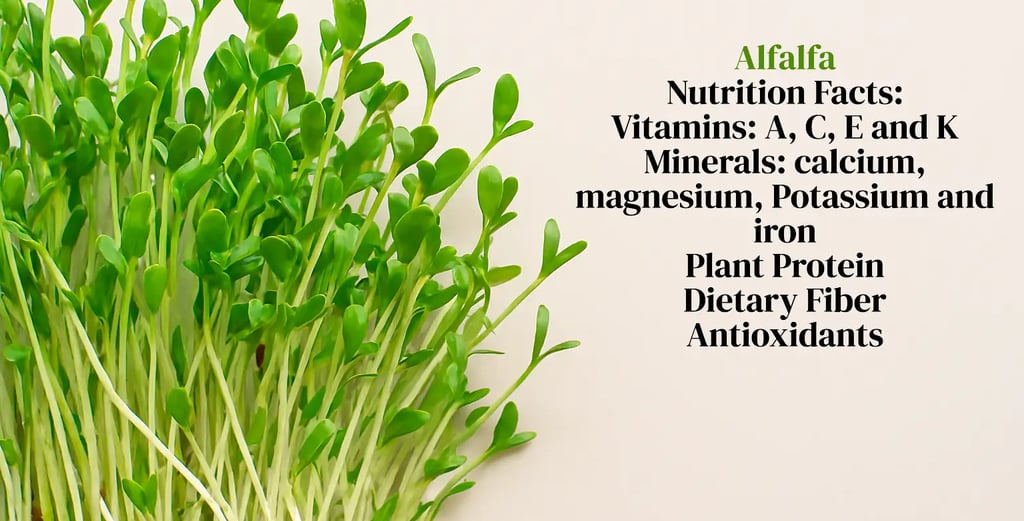Benefits of Alfalfa , Nutrition & Uses: The Complete Guide to Medicago Sativa
Discover the powerful health benefits of Alfalfa (Medicago sativa). Learn about its rich nutrition, medicinal uses, and easy ways to add this superfood to your daily diet.


What is Alfalfa (Medicago sativa)?
Alfalfa, scientifically known as Medicago sativa, is a perennial flowering plant from the Fabaceae legume family. Known as a superfood herb, alfalfa is packed with vitamins, minerals, antioxidants, and plant-based protein. Originating in the Middle East, it has been cultivated for thousands of years, traditionally as animal fodder, but today it’s valued worldwide for its health-boosting properties in human diets.
With deep roots that absorb nutrients from the soil, alfalfa offers an impressive nutritional profile, making it a staple in natural medicine and plant-based nutrition.
Alfalfa Nutrition Facts: A True Superfood
Alfalfa is a nutritional powerhouse rich in:
Vitamins: A, C, E, and K (Vitamin K being especially abundant for bone and blood health)
Minerals: Calcium, magnesium, potassium, and iron
Plant Protein: Excellent for vegetarians and vegans
Dietary Fiber: Supports digestion and healthy metabolism
Antioxidants: Flavonoids and phenolic acids that fight oxidative stress
Key Benefit:
Vitamin K in alfalfa promotes strong bones and proper blood clotting, while its fiber content helps with digestion, cholesterol control, and blood sugar regulation.
Top Medicinal Benefits of Alfalfa
Alfalfa’s high nutrient density and phytochemical composition make it a powerful natural remedy for various health concerns:
1. Improves Digestive Health
Rich in dietary fiber, alfalfa promotes regular bowel movements, relieves constipation, and supports a healthy gut microbiome.
2. Boosts Immunity
Loaded with antioxidants like flavonoids and saponins, alfalfa strengthens the immune system, helping the body fight infections and inflammation.
3. Supports Heart Health
Alfalfa’s saponins may help reduce cholesterol levels, improving cardiovascular function and lowering the risk of heart disease.
4. Aids in Weight Management
High fiber content keeps you full for longer, helping control appetite and support healthy weight loss.
5. Regulates Blood Sugar
Some studies suggest alfalfa may assist in balancing blood sugar levels, making it beneficial for those with insulin sensitivity.
How to Eat Alfalfa: Easy Ways to Add It to Your Diet
Adding alfalfa to your daily meals is simple and delicious:
Alfalfa Sprouts: Add fresh sprouts to salads, sandwiches, and wraps for a crunchy, nutrient-rich boost.
Alfalfa Tea: Brew dried leaves in hot water for a soothing, detoxifying drink.
Alfalfa Powder: Mix into smoothies, protein shakes, or energy drinks for quick nutrition.
Cooking with Alfalfa: Add fresh or lightly cooked alfalfa leaves to soups, stews, or create a unique alfalfa pesto.
Conclusion
Alfalfa (Medicago sativa) is more than just livestock feed—it’s a superfood for humans, offering a wide range of health benefits from improved digestion and immunity to better heart health and weight control. Whether you enjoy it fresh, brewed, or in supplement form, adding alfalfa to your diet can be a natural and powerful step toward better health.
